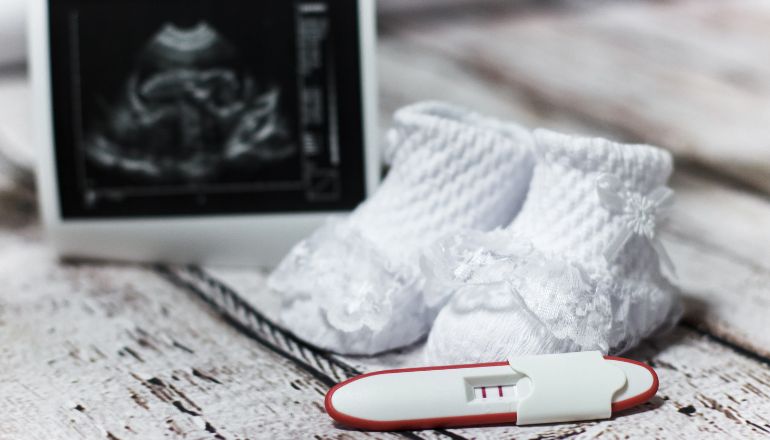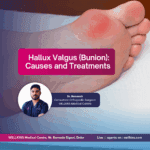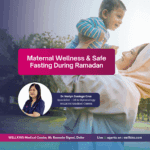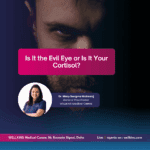Author: Dr.Sagnika Dash (Specialist Obstetrician and Gynaecologist – WELLKINS Medical Centre)
Those two lines on the test strip meant the world to me! What did you feel like when you first found out you were pregnant? Am I really pregnant? Do I need to visit a doctor? Should I repeat this test? Why is the line so faint? Is my baby healthy? How can I confirm if what I’m seeing is actually true? And countless more questions and concerns…
Detecting pregnancy marks the initial step towards a relationship with your unborn baby and a bittersweet connection with your gynecologist. This effort aims to provide clear, comprehensive, and practical information to empower you in making informed decisions and being well-prepared for this journey.

When is the Right Time for a Pregnancy Test?
The hormone measured in a card-test is beta HCG. Produced by specific cells, it can become active as early as 10 days post-ovulation. While technically possible to detect pregnancy before missed periods, it’s advisable to wait until after a missed period. For those with irregular cycles, waiting up to 35 days from the first day of the last period is recommended before taking the test.
Conducting the Pregnancy Test:
An early morning sample is recommended for the test to prevent urine dilution. Always check the card’s expiry date. If you’re unable to see even a single line (the control line), perform the test again.
Possible Misleading Results:
Yes, sometimes even if you are pregnant, the card might show a negative result. This can happen due to various causes:
- Extremely diluted urine or testing too early in pregnancy, leading to a missed pregnancy.
- Hook effect: When the pregnancy hormone level is extremely high, the card might fail to read it, resulting in a false negative test.
In some instances, a positive test might occur even when you’re not pregnant due to: - Blood or protein in urine: Recheck with a blood sample for pregnancy hormones.
- Consumption of certain medications like Aspirin, Carbamazepine, methadone, or contamination with seminal fluid.
- Specific tumors producing pregnancy hormones: While rare, consult your doctor for further guidance to ease any excessive worries.
What are the other symptoms of pregnancy that I need to be aware of?
The following signs and symptoms can be seen during pregnancy but caution has to be exercised as none of these features might be present , yet there is a pregnancy.
• Missed period is the commonest symptom of pregnancy : Sometimes, women may bleed even if they are pregnant well into their third month of pregnancy. This condition will need an assessment with an ultrasound to date the pregnancy.
• Breast tenderness: Other causes of breast tenderness includes pre-menstrual syndrome
• Nausea and vomiting (Usual around 6 weeks into pregnancy) : One must rule out gastric, renal(kidney related), Hepatic (liver related) causes of nausea and vomiting.
• Mood changes : A frequent association with pregnancy but can have numerous causes.
Detecting pregnancy marks the initial step towards a relationship with your unborn baby and a bittersweet connection with your gynecologist. This effort aims to provide clear, comprehensive, and practical information to empower you in making informed decisions and being well-prepared for this journey.
Confirming Pregnancy:
A blood report of the pregnancy hormone alone isn’t enough for a diagnosis. An ultrasound is essential to:
• Detect the earliest sign of pregnancy: the gestational sac.
• Monitor developments: including the increasing sac size and growth of structures like the yolk sac and embryo.
• Confirm the baby’s health: Detecting the heartbeat.
• Identify an ectopic pregnancy.
• Provide insight into surrounding structures like ovaries, tubes, and any womb issues such as fibroids.
• Aid in identifying the type of twins and the best way to manage them throughout pregnancy.
Early scanning is advantageous for accurately estimating the expected delivery date and can be vital for managing twin pregnancies. Therefore, an early scan, coupled with a blood pregnancy test, is crucial.
If the line is faint, does that mean I have a weak pregnancy?
A faint line can appear in early pregnancy and does not determine if it is a healthy pregnancy or not. A faint line during pregnancy needs to be followed up with blood tests on a weekly basis or every 2 days if there is any spotting/bleeding. The rise in the hormone levels will be a guide to determine if the baby is healthy. If the hormones keep rising, your doctor would suggest you when to go for a scan.
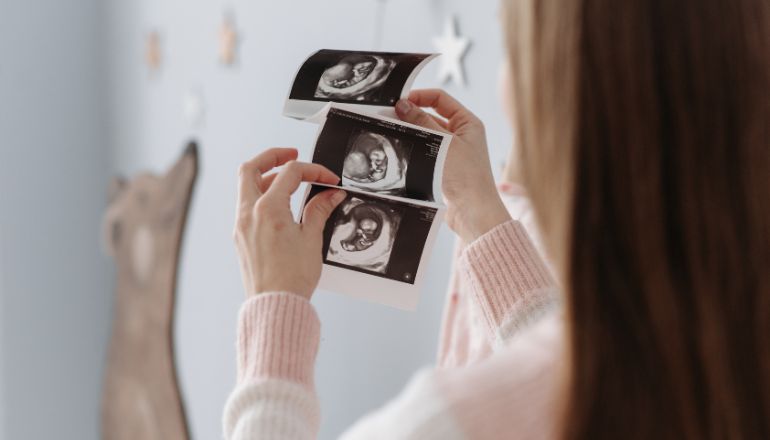
Will an internal scan (Transvaginal/TVS) harm my baby?
A transvaginal scan will not harm the baby and does not cause miscarriage. It is equally important to understand that miscarriage is age dependent and can happen to anyone. At the age of 30, almost 1 in 5 pregnancies has a chance of not developing into a full-term pregnancy. This probability of a miscarriage increases to 50% at 40 years of age. Once you are aware that not every line in the pregnancy test will develop into a healthy child, it’s easy to set expectations and move ahead with least trauma if things do not turn out the way you wanted them to! A transvaginal scan will be additionally helpful if there is a suspicion of an Ectopic pregnancy ( An unhealthy pregnancy where the baby is present outside the womb and can turn into a life-threatening condition if not diagnosed and managed appropriately)
How can mood changes affect my pregnancy?
People have been told that pregnancy is amazing, it’s a blessing that few would have. However, feeling low during early pregnancy and throughout the entire duration is normal. One needs to acknowledge this feeling and seek appropriate support in coping up with the thoughts. The hormonal changes during pregnancy can make some people elated while others feel scared, sad, and guilty of having these negative thoughts. Modern anti-depressants can help in getting over a particularly difficult phase and are considered safe during pregnancy. Not seeking help might make the pregnancy difficult and the stress hormones might start affecting your sugars and blood pressure and can lead to an early delivery which is challenging for the baby.
Being pregnant comes with its set of dreams and apprehensions, if you feel you would need help to cope up, please visit your doctor. Follow the advices and stay calm.


